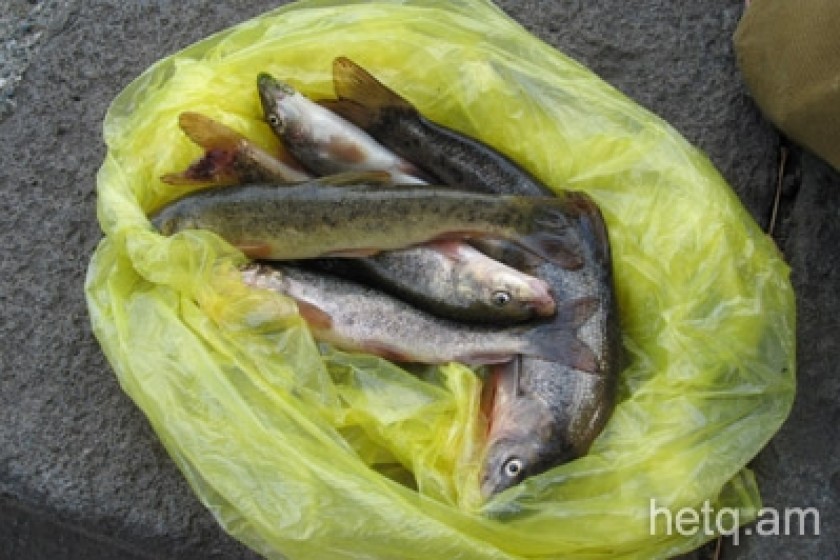
Debed River Fish: Risky Eating but the Poor Have Few Options
The old guys fishing the Debed River from the banks in the town of Alaverdi say that the catch has never been better. The fish are bigger than ever and the number of species has even increased, they say.
These factors have also led to an increase in the number of fisherman who can sell what they catch to local residents.
One month ago a guy caught a 6 kilo tchal and rumour has it that he sold it for 40,000 AMD. They say this species of river fish is quite delectable.
But not everyone is willing to take the risk and eat fish caught from the river which serves as a dumping ground for the waste materials of the Akhtala Mining Combine and stone processors in the area.
Then there's the raw sewage from the communities of Vanadzor, Pampak, Tumanyan, Alaverdi and Akhtala that's dumped as well.
Perhaps it's this organic-toxic mix that has affected the DNA of the fish – making them bigger as a result.
Recently, Armen Saghatelyan, Director of Ecological Noosphere Studies of the RA National Academy of Sciences, pointed to the organic wastes as a main factor in the increase in the size of local fish.
A majority of the fisherman don't eat what they catch. They probably are turned off by what they see floating down the river as they fish.
They prefer to sell their catch to local restaurants where locally caught fish is much in demand.
So far, it's up to the consumer to decide whether fish from Debed are safe to eat or not. The government hasn't yet issued any health advisories.
Caveat emptor (Buyer beware) seems to be the catchword of the day.
Armen Saghatelyan told me that samples of Debed fish were examined three years ago and that large concentrations of heavy metals were found in their livers. The scientist assured me that those eating the fish remove the liver along with the guts before cooking, thus removing any potential health threat.
He did say that more detailed studies on Debed fish were in order.
Fisherman Levon Avagyan said that while prices for the tchal fish had increased, he preferred to see his catch on the family dinner table.
Like many fishers around the world, Levon said that the real reason he sits at the river bank with the long pole is to find a bit of rest and relaxation.
Similar sentiments were expressed by Robert Mnatsakanyan, another local fisher.
"It calms my nerves. I suffer from high blood pressure. Fishing has a calming effect. I fish because it's an interesting pursuit. I always come to the same spot. But I don't eat what I catch. A fisherman really doesn't eat fish.
Robert says that he wouldn't risk eating fish from the Debed.
"Instead, I give them away to those who ask. There are many people who want the fish I catch."
Most of the guys say that fishing is best during the evening hours.
I caught up with Rafik Arakelyan fishing from the bank of the road paralleling the river.
"It's been an hour so far without a bite," Rafik groaned.
The 63 year-old, who has cardiac problems, says he got into fishing 5 years ago on the advice of his doctor.
Rafik also doesn't eat what he catches. He's seen what flows in the river alongside the fish.
"It was a bag full of, whatchama calls it, human intestines and such. Probably from some morgue upstream. Others have spotted the same type of innards. It turned my stomach something fierce."
After his morbid description, I was surprised when he told me that his children and grandchildren eat the fish he pulls out of the Debed. I asked him why.
"Hey, what can I do about it? They eat the whole fish. Me? I'm disgusted by them," Rafik answered.
Sourik Shakhkyan, another fisherman, confirmed the story of bags of human body parts bobbing down the river.
He said that with the high price of meat, many of Alaverdi's poorest have turned to Debed fish as a substitute.
"Hey, whether that's good or bad is somewhat beside the point. Poor people eat the fish because they can't afford meat nowadays. Can you really blame them?"
 Videos
Videos Photos
Photos
Comments (11)
Write a comment